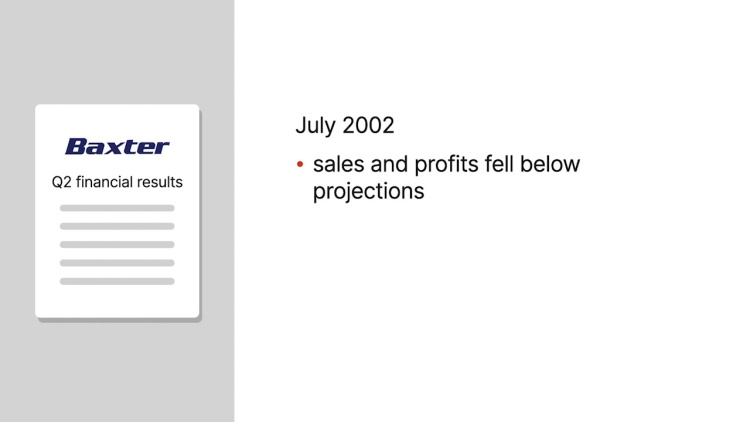Asher v. Baxter International Inc.
United States Court of Appeals for the Seventh Circuit
377 F.3d 727 (2004)
- Written by Jamie Milne, JD
Facts
Medical manufacturer Baxter International Inc. (Baxter) (defendant) released second-quarter financial results on July 18, 2002. The reported sales and profits were significantly below analysts’ expectations, and Baxter’s shares dropped from $43 to $32. The analysts’ expectations were based on projections repeatedly made by Baxter in Securities and Exchange Commission documents, press releases, and oral statements between November 5, 2001, and July 18, 2002. Baxter projected revenue growth in the low teens. Brian Asher and other investors (plaintiffs) sued Baxter, seeking to represent a class of all investors who had either purchased Baxter shares on the market or acquired them in a stock-for-stock exchange when Baxter acquired another company. They alleged that Baxter’s projections were materially misleading and therefore violated the Securities Act of 1933 and the Securities and Exchange Act of 1934. Specifically, they contended that the projections failed to note that: (1) Baxter’s renal division consistently failed to meet internal budgets, (2) Baxter had closed multiple plants, and (3) Baxter’s bio-science division had experienced a costly sterility failure. Baxter had not changed its projections or cautions to investors after the plant closures or the sterility failure. The district court dismissed the complaint on the grounds that Baxter’s projections fell within the safe-harbor provisions of the Private Securities Litigation Reform Act of 1995 (PSLRA), 15 U.S.C. §§ 77z-2, 78u-5. The investors appealed.
Rule of Law
Issue
Holding and Reasoning (Easterbrook, J.)
What to do next…
Here's why 904,000 law students have relied on our case briefs:
- Written by law professors and practitioners, not other law students. 47,100 briefs, keyed to 995 casebooks. Top-notch customer support.
- The right amount of information, includes the facts, issues, rule of law, holding and reasoning, and any concurrences and dissents.
- Access in your classes, works on your mobile and tablet. Massive library of related video lessons and high quality multiple-choice questions.
- Easy to use, uniform format for every case brief. Written in plain English, not in legalese. Our briefs summarize and simplify; they don’t just repeat the court’s language.





